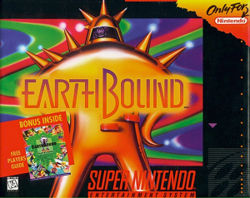EarthBound

| |
| Earthbound | |
| Developer | Ape, Inc. & HAL Laboratory |
| Publisher | Nintendo |
| System | Super NES, Wii U Virtual Console, 3DS Virtual Console (New 3DS) |
| Release Date | Super NES JP August 27, 1994 US June 1, 1995 Wii U Virtual Console JP March 20, 2013 US/PAL July 18, 2013 3DS Virtual Console PAL March 3, 2016 JP March 4, 2016 US March 24, 2016 |
| Gallery | None |
| Rating | ESRB: K-A |
EarthBound is a RPG created by the famous Shigesato Itoi. It is known as Mother 2 in Japan, as it is the sequel to the Japan-only game Mother. It became popular in Japan, but did not do well commercially in America and only garnered a cult following. Like its previous game, it subverts the usual RPG setting by featuring a contemporary setting instead of a medieval or fantasy setting, with the characters using psychic abilities instead of magic. It also has a focus on humor for most of the game.
Story
Ness was sleeping one night when a meteor struck on a nearby hill. He woke up to go see it, but he couldn't get through so he went back to bed. Later, his annoying neighbor Pokey needed help finding his lost brother, Picky. They searched and eventually found Picky by the meteor. Before they left, the meteor began to glow.
A bee named Buzz Buzz appeared and explained that he was from the future. He said that in the future, an evil entity named Giygas rules the world, but they believe that four children can save the world. He explained that Ness was one of them. The group headed back home and on the way, they were attacked by a Starman, Jr.. that was very strong, but Buzz Buzz protected Ness and defeated him.
When they returned Pokey to his home, Pokey's mom spotted Buzz Buzz and swatted him. Before he died, he explained that Ness must visit eight Sanctuary Spots and gather the other chosen ones. He gave Ness the Sound Stone and died. So, Ness begins his epic journey and slowly began to meet the rest of the chosen ones: Paula, Jeff and Poo.
Gameplay
Earthbound uses a traditional RPG battle system. At the beginning of battle, the player selects the characters' actions. The HP uses a unique scrolling motion, allowing the player to heal before the countdown reaches 0 if the character receives a mortal blow. The order in which characters attack is determined by their speed. Each character can choose to attack, use a psychic ability, use an item, or run away.
Legacy
Though the game didn't do very well in America, it was wildly popular in Japan. The popularity of the game was probably the driving force in making Ness a character in Super Smash Bros. and its sequels. Also, Mr. Saturn has made appearance in a few other games.
Sequels
Originally, a Nintendo 64 sequel called Earthbound 64 was planned, but was moved to the Nintendo 64DD. In August 2000, the title was scrapped due to the developer's inexperience with the hardware and 3D graphics.
Earthbound 64 was revived as a game for the Game Boy Advance, Mother 3. The graphics were different, but the scenario work remained very much the same.
Ports and Remakes
- In Japan, Earthbound was ported to the Game Boy Advance in Mother 1 + 2. Several sounds and one bug was changed.
- A demo version of Earthbound was included in Super Smash Bros. Brawl as a Masterpiece. This caused confusion since the Masterpieces were all demos for Virtual Console games, and Earthbound has yet to be released (or even announced) for the Virtual Console in any region. Additionally, the Earthbound demo only appears in the Japanese version. Most sources initially indicated that Earthbound would not receive a Virtual Console release due to copyright issues.
- In 2013, Earthbound finally received a port on the Wii U as part of the Wii U Virtual Console, and it was also made available for the New 3DS through the 3DS Virtual Console in 2016.
- In Japan, it was also originally made available at a heavily reduced price for a limited time prior to the Virtual Console being launched on the Wii U, as part of the Wii U Virtual Console Trial Campaign.
- In 2017, it was one of the games included in the Super NES Classic Edition, though it was not included in the Japanese release.